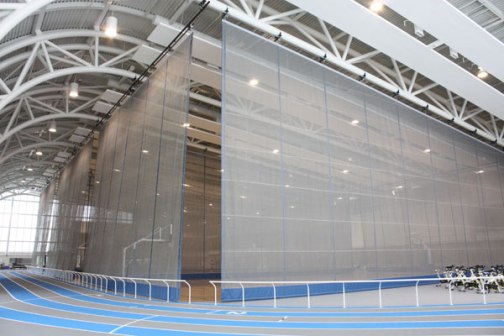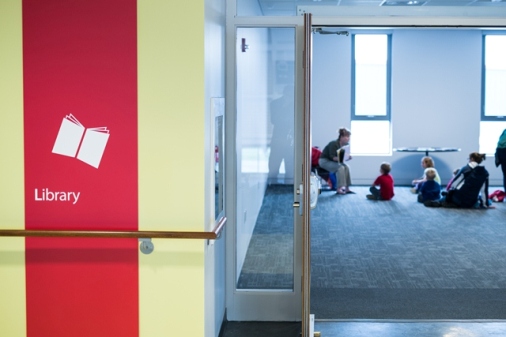If you’ve ever passed by the corner of Gordon and Victoria in Whitby, you may have noticed the large new building that sits right in the corner. As of a year ago, that is the brand new addition to what is known in Whitby as the sports hub of the town, and that is where the Abilities Centre, a brand new 125,000 square foot facility, can be found. This recreational facility is open to people in the community from all walks of life, ages and more importantly, all abilities.
I first heard of this recreational facility when we attended a series of conferences earlier this year. Just like I’m sure a lot of people do, when I first heard the name, I thought it was a place that offered recreational programs for people with disabilities. Upon entering the building, I realized that was not the case: This is an open, warm and very inviting place that caters to everyone, and as Jessica Vreugdenhil, Manager of Community Relations and Marketing for the centre explained, that is in fact their mission: to be a place where everyone, regardless of whether they have a disability or not, can feel welcome and where “you feel like you belong and you feel like this is home and you take ownership of the space.”
Though the Abilities Centre has been open since spring last year, plans for its construction and what areas the actual building would include have been brewing for more than a decade. The opinions of members of the Whitby community, through focus groups, were carefully considered in planning the structure not only of the building itself, but of the programs that should be offered once the centre opened to the general public.
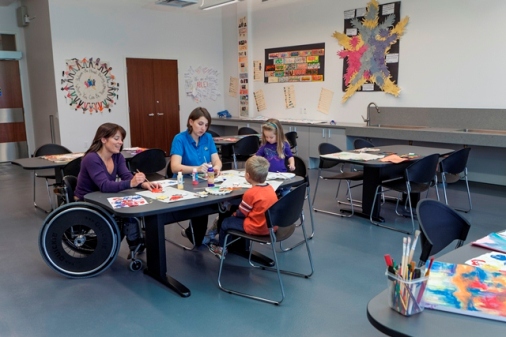
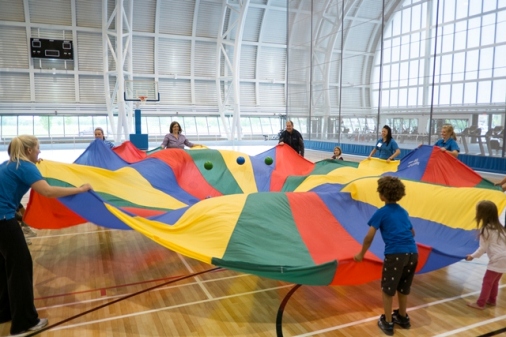
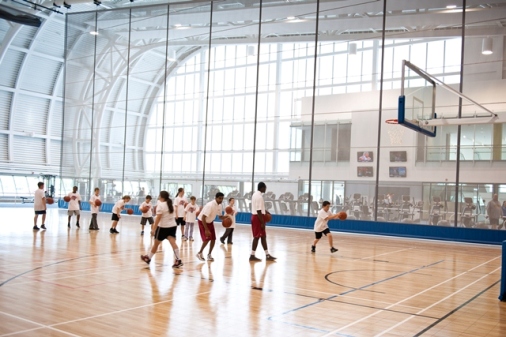
Structurally, there are many ways in which the building is set up to facilitate its use to those members with disabilities, such as visual impairments or mobility issues. But as Vreugdenhil explained, “You don’t have to have a disability to come here, but if you do, it definitely makes it easier to navigate a lot of the accessible features in the centre. They’re very subtle. If you don’t particularly need them, they’re not overly noticeable.” Yellow, for instance, is a prominent colour throughout the hallways, and that is because for people who are losing their vision yellow is often the last colour they see. These small subtleties throughout the facility, such as visually noticeable transition spaces and a variety of textures and colours in tiles and walls, are made obvious for those who need them and will use them, but are not particularly intrusive to those who don’t.
Programming is also offered for people with all abilities, says Vreugdenhil, and staff and instructors adapt them based on the needs of its participants. No two classes are ever the same. We visit the weight room, where they offer studio classes like yoga and pilates. The gym is equipped with machines that people of all abilities can use and is also staffed with trained fitness instructors, kinesiology graduates and personal trainers as well. Personal support workers can accompany– and stay at no charge– with members who have a disability.
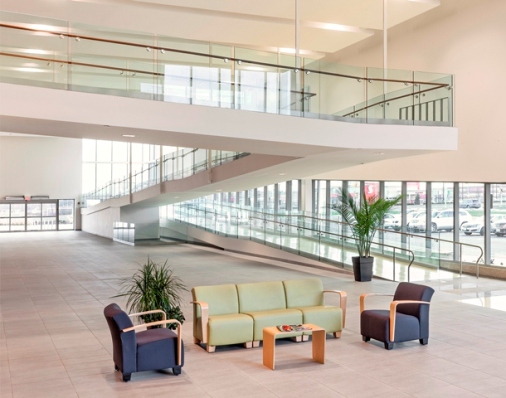
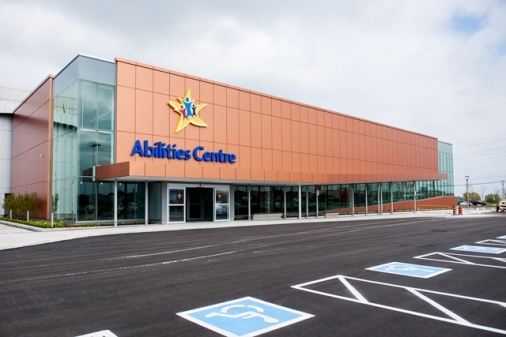
There is a very active and popular Adult Social Club for people with disabilities– and it is a testament to the need for programs like this one in the community that it filled up as soon as spaces opened up. Elderly members can also take advantage of the reciprocal agreement the centre has with the Town of Whitby Seniors Activity Centre because they can come in and walk along the indoor track from 5:30 to 9:30 in the morning. Right now, over 70 seniors are taking advantage of this great exercise and socialization opportunity, says Vreugdenhil. In exchange, the town will let Abilities Centre’s members make use of the Anne Ottenbrite swimming pool during lane and free swim times at no extra cost, so it’s a great mutual benefit.
There are also some excellent programs for families, all grounded in some sort of educational component, Vreugdenhil points out, for example, cooperation and learning how to work together as a team. They also aim to improve the physical well being of kids and parents alike because if parents sign the kids up for any program (arts, music, sports), they can also make use of the facilities and hop on a treadmill, walk or run on the track or even stay with younger siblings along with the program participant. This is not a place for childminding but a place where families can stay together, whether doing an activity together, or separately but within the same space. “You can have your daughter in art class and you can have your son in Tae Kwon Do and you can do something yourself too,” says Vreugdenhil. “So it’s really about taking a look at health for the whole family and health beyond what it means physically, mentally and spiritually as well.”
The Abilities Centre is a registered charity and its operational costs are met through memberships, donations, fundraising and rentals. They have some beautiful spaces that corporate organizations and members of the community can rent for various purposes, from holding large meetings and conferences in the board room and multi-purpose room to holding a family get together or a child’s birthday party (complete with staff-led activities) in the games room and the lounge.
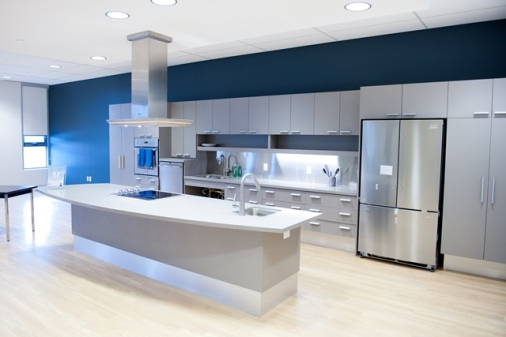
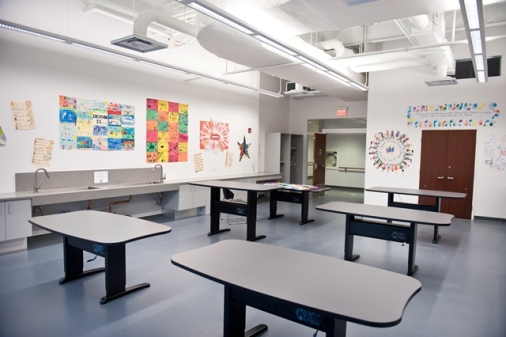
In building this innovative facility– and it is mostly innovative in that it aims to change the perception we all have about those who live with a disability and who, just like able-bodied people, can also take advantage of recreational facilities and look after their overall health and well-being– it is the hope that this space will be a place where everyone can come to achieve their goals: a place where they can all come in, exercise, learn new skills, make new friends and grow as strong healthy individuals and healthy families. “Our mission is to change the social fabric by creating an inclusive environment for people of all ages and all abilities,” says Vreugdenhil. “You can’t do that in a day. A lot of the things that exist are meant to exclude and so we have a really lofty goal and mission, but we’re taking it day by day and each person who comes through here and is changed is helping us further our mission, and it’s really taken on a life of its own. Our members are our biggest advocates and they’ll take that message into the community and say, ‘Have you been to the Abilities Centre?” Current members are doing the job of letting everyone know that the perception that this place is only for people with disabilities is erroneous and the message keeps spreading.
The Durham community has been welcoming and accepting of this message and mission. They have accepted this huge switch in thinking in a very short time, and that has been a pleasant surprise, says Vreugdenhil. Having only been open for a year, they hope that in the future places like the Abilities Centre will be the norm and not the exception. “I’d like to see people really call this their home, for very few people to have that conception about it being a place for disabilities. I’d like everyone to know about it and to just come here and hang out and really embrace it and make it their own,” she concluded.
